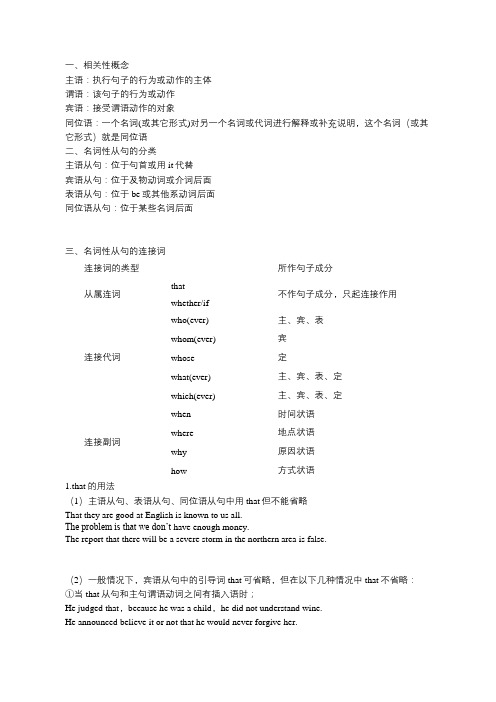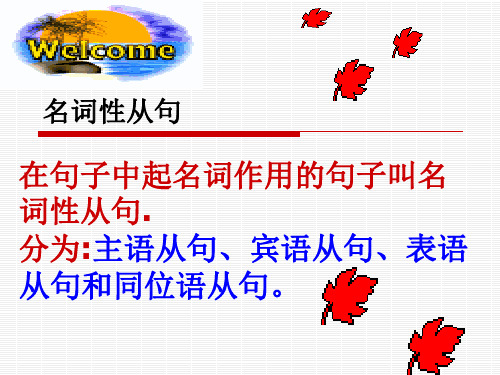名词性从句
- 格式:docx
- 大小:24.55 KB
- 文档页数:8

名词性从句一、定义:名词性从句在功能上相当于名词,是一个句子分别充当另一个句子的主语、表语、宾语和同位语,由此被称为主语从句,表语从句,宾语从句和同位语从句。
辨别下列从句属于哪种名词性从句并分析:1)Why they haven’t left yet is unclear.2)It was good news that everyone got back safely.3)Polly didn’t know which way she should go.4)I’m interested in who that tall man is.5)We all thought it good news that the fog had finally gone.6)My question is whether Polly can find her way home.7)The fact that Polly didn’t ask for the man’s name is a pity.总结:名词性从句主要由陈述句、一般疑问句、特殊疑问句充当。
1)陈述句充当名词性从句时,由that引导;2)一般疑问句充当名词性从句时,由if或whether引导从句;3)特殊疑问句充当名词性从句时,由疑问词本身做连词引导从句。
4)名词性从句的语序应使用陈述句语序,不可用一般问句语序。
二、引导名词性从句的从属连词及从句语序1.连接词that;功能1)不充当句子成分2)无词义3)只起连接作用。
2.if/whether;功能:1)意为“是否”,有词义2)不做句子成分3)起连接作用翻译:1)I know that he will come thisevening.___________________________________________2) Whether we will go there or not hasn’t been decided yet.______________________________3.连接代词:what(ever), which(ever), who(ever), whom(ever), whose(ver)功能:1)有词义2)引起从句3)且在从句中充当一定的句子成分,常做从句中的主语、宾语、表语和定语。

名词性从句一.概念在句子中起名词作用的句子叫名词从句(Noun Clauses).名词从句的功能相当于名词词组,它在复合句中能担任主语、宾语、表语、同位语、介词宾语等,因此根据它在句中不同的语法功能,名词从句又可分别称为主语从句、宾语从句、表语从句和同位语从句。
二.语序所有名词性从句都是引导词(在最前)+陈述句语序(即:主语在前,谓语在后.即使从句表达的是疑问含义).What we can't get seems better than what we have.The photographs will show you what our village looks like.He asked how much I paid for the violin.三.引导词引导名词性从句的引导词类别词义在从句中的作用从属连词that无任何词义仅起连接作用,在从句中不充当任何句子成分从属连词whether和if(是否)意为“是否”,表明从句意义的不确定性起连接作用,在从句中不充当任何句子成分关系代词who, whom, what,which,whose,whoever, whomever, whatever, whichever 有各自自身的意义起连接作用,并在从句中充当主、表、宾、定语等关系副词when, where, why, how, however, whenever, wherever 有各自自身的意义起连接作用,并在从句中充当状语注意:名词性从句引导词,只有that在引导主语从句后置时,以及在引导宾语从句时有时可以省.其它情况下,以及其它名词性从句引导词均不能省.注意:只有在引导宾语从句(有些情况下不能用if代替whether)以及whether引导主语从句后置时才可用if.其它情况下,以及引导其它名词性从句时均不能用if.四.分类详解主语从句在句子中作主语的句子叫主语从句.1.由从属连词that, whether引导的主语从句:▲that引导主语从句放在句首时,that不可省.That light travels in straight line is known to all. (that不能省)That he will succeed is certain. (that不能省)That he is still alive is a wonder. (that不能省)That the baby could speak made his parents very happy. (that不能省)That she became an artist may have been due to her father’s influence. (that不能省)______ you don’t like him is none of my business.(1992上海高考试题)A. WhatB. WhoC. ThatD. WhetherAnswer:C▲whether引导的主语从句一般位于句首.也可用it作形式主语,将其后置,此时whether可换为if. (if引导主语从句时,只能用it作形式主语,放在句首,而将if引导的主语从句放到句末.) Whether she will come or not is still a question.Whether the old couple enjoy the trip remains to be proved.Whether we will hold a party in the open air tomorrow depends on the weather.It was a problem whether they would support us.It remains to be seen whether it will do us harm or good.It is uncertain if he will leave for Beijing tomorrow.2.由关系代词who/whoever; whom/whomever(少); what/whatever; which/whichever; whose 引导的主语从句.Who will the win the scholarship is unknown.Who will be sent abroad to further his studies is not announced.Who murdered the present is being investigated.Whoever comes is welcome.Whoever leaves the room last ought to turn off the lightsWhoever breaks the rule must be punishedWhoever breaks this law deserves a fine.Whoever wants to see this film can go with us tonight.Whoever helped to save the drowning girl is worth praising.Who/whom he will work with is still a secret.Whom we must study for is a question of great importance.Whoever you fell in love with has nothing to do with me.whoever既用作主格也用作宾语(作宾语时不宜用whomever,因为在现代英语中whomever 已几乎不用).What you have done might do harm to other people.What must be done has been done.What is worth doing is worth doing well.What you said just now hurt her feelings.What impressed me most was his great responsibility for his work.What was once regarded as impossible has now become a reality.What surprised me most was that such a little girl could play the violin so well.Whatever the parents do is for their children.Whatever you say is of no use now.Whatever was said here must be kept secret.Which school will win the prize is not known.I read it in some book or other, does it matter which it was?Whichever you take will be yours.Whichever book you choose doesn’t matter to me.Whichever of us gets home first starts cooking.Whose relatives lost their life in the shocking earthquake hasn’t been announced.3.由关系副词when; where; why; how引导的主语从句.When the plane is to take off hasn’t been announced.Where the heroine went is not mentioned at the end of the story.Where the English evening will be held is still under discussion.Why he often comes here is known to us all.Why he didn't come here is not clear to anyone.Why the sun in the morning looks bigger than the sun at noon is very interesting.How he was successful is still a puzzle.How he managed to finish the composition in such a short time is still a mystery.How and why Einstein had come to Princeton, New Jersey is a story of struggle, success, and sadness.How much water is flowing can be measured easily. 水的流量是多少……主语从句的主谓一致问题①:单个的主语从句作主语,谓语动词用单数;如果两个或两个以上的主语从句作主语,谓语动词用复数.When and where he was born hasn’t been found.How and why he came to the lonely small island is still a mystery.When the person was murdered and why he was murdered are still unknown.When they will start and where they go have not been decided yet.②:what引导的主语从句,谓语动词可由表语来决定.What we need are women workers.What we need is more time and money.4.it作形式主语引导主语从句如果主语从句太长,为避免句子结构头重脚轻,我们可用it作形式主语,而把主语从句放在主句谓语部分之后.这样句子结构就更加平衡.此时主语从句的引导词一般是that(一般不省,亦可省略),也可以是其它引导词.▲It + be +形容词+ that-从句It’s(im)possible/probable/important/necessary/fortunate/certain/clear/obvious/likely/natural/ strange that…It is probable that he told her everything.It's strange that he didn't come yesterday.It is likely that there will be a storm tomorrow.主语从句中的虚拟语气:其中在it’s natural/important/ necessary/strange that…结构中,主语从句常用should +do的虚拟语气(美语中省去should).It was necessary that we (should) make everything ready ahead of time.It is important that every pupil (should) be able to understand the rule of school.It is natural that she should do so.It is essential that these application forms be sent back as early as possible.It is necessary that a college student ____at least a foreign language.(上海1993)A. mastersB. should masterC. masteredD. will masterAnswer:B▲It + be +名词+ that-从句It’s a pity/a shame/an honor/a fact/a surprise/a question/good news/no wonder/ common knowledge/high time that…It is a pity that you didn’t attend the lecture yesterday.It is a pity that she has made such a mistake.It’s no wonder that you’ve achieved so much progress.主语从句中的虚拟语气:其中在此结构中若为surprise, a pity, a shame, no wonder等表示惊奇、惋惜的名词时,主语从句常用should +do的虚拟语气(美语中省去should).若为advice, desire, demand, order, proposal, recommendation, requirement, suggestion等表示建议、请求、要求、命令等名词时,须用should +do的虚拟语气(美语中省去should).It is my proposal that he be sent to study further abroad.It’s a pity that I (should) miss the lecture.▲It + be + -ed 分词+ that-从句It’s said/reported/believed/thought/announced/decided/known to all /must be pointed out/must be admitted that…It is reported that the number of wild animals in Africa is decreasing.It’s announced that the hostages have been released.It’s decided that the meeting has been put off till next Monday.It’s known to us how he became a writer.其中在此结构中若为request, demand, require, beg, propose, suggest, recommend, advise, order, command, urge, desire等表示建议、请求、要求、命令等的动词,则主语从句中须用should +do的虚拟语气(美语中省去should).It is required that nobody (should) smoke here.It is desired that we(should)get everything ready this evening.It is suggested that we (should) hold a meeting next week.▲It +不及物动词+ that-分句It seems/appears/happens (to sb)/occurred to sb/turned out/doesn’t matter /make no difference that…It seems to me that you object the plan.It happened to me that I had been out when he called.It occurred to me that I forgot to shut the windows.It doesn’t matter whether he likes or not.It makes no difference that you will go today or tomorrow.常将seem, appear 等后的从句的否定转移到前面。

一、相关性概念主语:执行句子的行为或动作的主体谓语:该句子的行为或动作宾语:接受谓语动作的对象同位语:一个名词(或其它形式)对另一个名词或代词进行解释或补充说明,这个名词(或其它形式)就是同位语二、名词性从句的分类主语从句:位于句首或用it代替宾语从句:位于及物动词或介词后面表语从句:位于be或其他系动词后面同位语从句:位于某些名词后面三、名词性从句的连接词连接词的类型所作句子成分从属连词that不作句子成分,只起连接作用whether/if连接代词who(ever)主、宾、表whom(ever)宾whose定what(ever)主、宾、表、定which(ever)主、宾、表、定连接副词when时间状语where地点状语why原因状语how方式状语1.that的用法(1)主语从句、表语从句、同位语从句中用that但不能省略That they are good at English is known to us all.The problem is that we don’t have enough money.The report that there will be a severe storm in the northern area is false.(2)一般情况下,宾语从句中的引导词that可省略,但在以下几种情况中that不省略:①当that从句和主句谓语动词之间有插入语时;He judged that,because he was a child,he did not understand wine.He announced believe it or not that he would never forgive her.②有多个that引导的从句时,第一个that可以省略,而其他的that常不可省略;He told me (that) he had to leave and that he would be back soon.I believe (that) you’ve done your best and that things will get better.③介词except,but,besides,in等后跟that引导的宾语从句时;They share little in common except that they are form the same country.The reason lies in that she works harder than the others do.④当when,who,what,where,why,how等引导的从句与that引导的从句作主句谓语动词的并列宾语时。

名词性从句的用法名词性从句是英语中一种重要的从句结构,它在句子中承担名词的功能。
名词性从句可以作主语、宾语、表语和同位语,它的存在丰富了句子的表达方式,使句子更加灵活多样。
本文将详细介绍名词性从句的用法及其在句子中的不同作用。
一、名词性从句作主语名词性从句可以作整个句子的主语,承担句子的中心意义。
它常常由连接词that引导,但在口语和非正式场合下,that可以省略。
例句1:What she said is very important.(她说的话很重要。
)例句2:Whether he can come to the party is still unknown.(他能否参加聚会仍然未知。
)名词性从句作主语时,常常用于表达对某事情的看法、意见或态度,引导人们对该事情进行讨论。
二、名词性从句作宾语名词性从句可以作动词的宾语,从而承担动作的承受者或者指代某种情况。
例句1:She doesn't know what to do next.(她不知道接下来该怎么办。
)例句2:I believe that you are telling the truth.(我相信你在说实话。
)名词性从句作宾语时,它紧跟在动词之后,用来回答“做什么”、“如何”、“为什么”等疑问词所提出的问题。
三、名词性从句作表语名词性从句可以作主语和表语之间的联系,表达主语的性质、状态、特征等。
例句1:His dream is that he can become a successful businessman.(他的梦想是能成为一名成功的商人。
)例句2:The problem is whether we should continue with the project.(问题在于我们是否应该继续这个项目。
)名词性从句作表语时,从句中的主语代替了主句的主语,连接词引导主从句的关系。
四、名词性从句作同位语名词性从句可以作名词的同位语,扩充对名词的解释或说明。


名词性从句引导词名词性从句是句子中充当名词成分的从句,它可以用来作主语、宾语、表语或同位语。
名词性从句的引导词根据不同的功能可以分为以下几类:疑问词、连词、连接副词和连接代词。
一、疑问词引导的名词性从句疑问词引导的名词性从句一般用来回答特定的问题,常见的有以下几个:1. 选择疑问词:who、which、what、whose等。
例如:Who is the winner of the competition?(谁是比赛的获胜者?)2. Yes/No疑问词:whether和if。
例如:I don't know whether/if he will come.(我不知道他是否会来。
)二、连词引导的名词性从句连词引导的名词性从句主要有三个:that、whether和if。
它们在从句中分别充当主语、宾语和表语。
1. that引导的名词性从句常用来作主语或宾语。
例如:That he is late again is really annoying.(他又迟到了真让人生气。
)I know that he is a good student.(我知道他是一个好学生。
)2. whether引导的名词性从句一般用来作主语或宾语。
例如:Whether he will come is still uncertain.(他是否会来还不确定。
)I don't know whether he likes me or not.(我不知道他是否喜欢我。
)3. if引导的名词性从句一般用来作主语或表语。
例如:If it rains tomorrow, we will stay at home.(如果明天下雨,我们会呆在家里。
)The question is if we can finish the task on time.(问题是我们是否能按时完成任务。
)三、连接副词引导的名词性从句连接副词引导的名词性从句主要有三个:where、when和how。
名词性从句noun clauses1. 名词性从句定义:在句子中起名词作用的句子叫名词从句。
(Noun Clauses)2. 名词从句的功能相当于名词词组, 它在复合句中能担任主语、宾语、表语、同位语等。
3. 因此根据它在句中不同的语法功能,名词从句包括:主语从句、宾语从句、表语从句和同位语从句。
1)What he does is important.2) I don’t like what he does everyday.3) This is what he does everyday.4) I don’t know about the fact that he is a teacher.4. 名词性从句中的连接词有:连词: that / whether / as if (though)连接代词: what /who/which / whose / whatever / whoever / whomever / whichever 连接副词: where / when / why / how / wherever / whenever1.宾语从句:1)定义:跟在动词或介词后面的从句叫宾语从句。
2)引导宾语从句的连接代词主要有: who, whom, what, which, whatever, whoever 等;连接副词主要有:where, when, how, why 等; 连词主要有that, if, whether。
3) that 在引导宾语从句时无词义,也不充当任何成分,且通常可以省略。
但如果含有两个或两个以上的并列宾语从句时,通常只有第一个从句的that可以省略,其余从句的that 一般不能省略。
如:My uncle said (that) he would come and that he would also bring his son.宾语从句中的连接词that在以下三种情况下不能省略:①当有两个that从句时, 第二个that不能省;②当that作介词宾语时, that不可省掉。
英语语法名词性从句在句子中起名词作用的句子叫名词从句。
名词从句的功能相当于名词词组, 它在复合句中能担任主语、宾语、表语、同位语、介词宾语等,因此根据它在句中不同的语法功能,名词从句又可分别称为主语从句、宾语从句、表语从句和同位语从句。
1. 引导名词性从句的连接词引导名词性从句的连接词可分为三类:连接词: that, whether ,if (不充当从句的任何成分)连接代词:what, whatever, who, whoever, whom, whose, which连接副词:when, where, how, why不可省略的连词:1. 介词后的连词2. 引导主语从句和同位语从句的连词不可省略。
例如:That she was chosen made us very happy. 她被选上了,我们很高兴。
We heard the news that our team had won. 我们听到消息说我们队赢了。
比较:whether与if 均为"是否"的意思。
但在下列情况下,whether 不能被if 取代:1. whether引导主语从句并在句首2. 引导表语从句3. whether从句作介词宾语4. 从句后有"or not"大部分连接词引导的主语从句都可以置于句末,用 it充当形式主语。
例如:It is not important who will go. 谁去,这不重要。
It is still unknown which team will win the match. 到底谁赢呢,形势尚不明朗。
2. 名词性that-从句1)由从属连词that引导的从句叫做名词性that-从句。
That只起连接主句和从句的作用,在从句中不担任任何成分,本身也没有词义。
名词性that-从句在句中能充当主语、宾语、表语、同位语和形容词宾语。
例如:主语:That he is still alive is sheer luck. 他还活着全靠运气。
名词性从句 【知识要点】 在句中起名词作用的从句叫名词性从句,它包括主语从句、宾语从句、表语从句和同位语从句。 引导名词性从句的连接词 连接词 词义 功能 that 无词义 不作成分,只起连接作用
whether/if 是否 不作成分,起连接作用
what,which 什么,哪个 作主语、宾语、表语
who,whom,whose 谁,谁的 作主语、宾语、定语
when,where,how,why 什么时候/地方,怎么样,为什么 作状语
how many/much 多少 作定语
how soon/often/long/much 多久,多久一次,多长,多么 作状语
主语从句 主语从句是在复合句中充当主语的从句,通常放在主句谓语动词之前或由形式主语it代替,而本身放在句子末尾。引导主语从句的连接词主要有三类:连接词that,whether;连接代词what,who,which, whose,whatever,whichever,whoever, whomever等;连接副词when,where,why,how等。 1.it 作形式主语和it引导强调句的比较 it 作形式主语代替主语从句,主要是为了平衡句子结构,主语从句的连接词没有变化。而it引导的强调句则是对句子某一部分进行强调,无论强调的是什么成分,都可用连词that。被强调部分指人时也可用who/whom。如: It is a pity that you didn’t go to see the film.你没去看那场电影真是遗憾。 It doesn’t interest me whether you succeed or not.你成功与否对我没有什么吸引力。 2.用it 作形式主语的结构 1)It is +名词+从句 It is a fact that ...事实是…… It is an honor that...非常荣幸 It is common knowledge that...……是常识 2)it is +形容词+从句 It is natural that...很自然…… It is strange that...奇怪的是…… 3)it is +不及物动词+从句 It seems that...似乎…… It happened that...碰巧…… 4)it +过去分词+从句 It is reported that...据报道…… 已证实…… 3.主语从句不可位于句首的五种情况 1)if 引导的主语从句不可居于复合句句首。 2)It is said ,(reported)...结构中的主语从句不可提前。如: It is said that President Jiang will visit our school next week.(right)据说江主席下周要来我校视察。 That President Jiang will visit our school next week is said.(wrong) 3) It happens...,It occurs... 结构中的主语从句不可提前。如: 他考试没及格。 That he failed in the examination occurred to him.(wrong) 4)It doesn’t matter how/whether ...结构中的主语从句不可提前。如: It doesn’t matter whether he is wrong or not.(right)他是不是错了,这一点不重要。 Whether he is wrong or not doesn’t matter.(wrong) 5)含主语从句的复合句是疑问句时,主语从句不可提前。如: Is it likely that it will rain in the evening? (right) Is that will rain in the evening likely? (wrong) 傍晚有可能下雨吗? 4.what 与that 在引导主语从句时的区别 what 引导主语从句时在从句中充当句子成分,如主语、宾语、表语,而that 则不然。如: What you said yesterday is right. 你昨天说的是对的。
宾语从句 宾语从句是在复合句中作宾语的名词性从句,通常放在主句谓语动词(及物动词)或介词之后。引导宾语从句的连接词主要有三类:连接词that,whether,if等,连接代词which,what,who,whom, whose,whatever,whichever,whoever, whomever,等,连接副词when,where,why,how等。 1.作动词的宾语 1)由that引导的宾语从句(that 通常可以省略),如: I heard that he joined the army. 我听说他参军了。 2)由what,whether (if)引导的宾语从句,如: She did not know what had happened. 她不知道发生了什么事。 3)动词+间接宾语+宾语从句。如: She told me that she would accept my invitation. 她跟我说她愿意接受我的邀请。 2.作介词的宾语,如: Our success depends upon how well we can cooperate with one another.我们的成功取决于我们的合作情况。 3.作形容词的宾语,如: I am afraid (that)I’ve made a mistake. 我恐怕是犯错了。 【特别提示】 that 引导的从句常跟在下列形容词后作宾语: anxious,aware,certain,confident,convinced,determined,glad,proud,surprised,worried,sorry,thankful, ashamed,disappointed,annoyed,pleased,hurt,satisfied,content 等。也可以将此类词后的that 从句看作 原因状语从句。 4.it 可以作为形式宾语 it不仅可以作为形式主语,还可以作为形式宾语而把真正的宾语that 从句放在句尾,特别是在带复合宾语的句子中。如: We heard it that she would get married next month. 我们听说她打算下个月结婚。 【特别提示1】 1.宾语从句的语序 在宾语从句中要用陈述句语序。如: ①He asked me when we could set out the next day.他问我第二天什么时候可以出发。 2.宾语从句的时态 (1)当主句的谓语动词是一般现在时时,其宾语从句的时态可以是任何适当的时态。如: she says(that)she will leave a message on his desk.她说她要在他桌子上留个便条。(从句是一般将来时) She says(that)she has never been to Mount Emei.她说她从来没有去过峨眉山。(从句是现在完成时) (2)当主句的谓语动词是一般过去式时,其宾语从句的时态一般要用适当的过去时态。如: He said there were no classes yesterday afternoon.他说昨天下午没有课。(从句是一般过去时) He said that he was going to take care of the baby.他说他会去照看这个婴儿。(从句是过去将来时) (3)当宾语从句是表达客观真理和规律的句子时,其时态仍旧用一般现在时。如: The teacher told us that nothing is difficult if we put our hearts into it.老师告诉我们世上无难事,只怕有心人。 He said that light travels much faster than sound.他说光比声音传播得快。 【特别提示2】 在使用宾语从句时需要注意下面几点: (1)动词find,feel,think,consider,make,believe,guess,suppose,assume等后有宾语补足语时,则需要用it作形式宾语,而将that宾语从句后置。如: I think it necessary that we take plenty of boiled water every day.我认为每天多喝开水是有必要的。 (2)hate,like,take,owe,have,take for granted等表示“喜欢;痛恨;认为”的动词或动词短语和see to表示“注意,留意”后有宾语补足语时,需要用it作形式宾语而将宾语从句后置。如: I hate it when they talk with their mouth full of food.我讨厌他们满嘴食物说话。 When you start the engine,you must see to it that the car is in neutral.启动发动机时,一定要使汽车的离合器处于空档位置。 (3)介词后的宾语从句。如: She is always thinking of how she can do more for others.她总想着如何才能为别人做得更多。
表语从句 表语从句是在复合句中作表语的名词性从句,放在系动词之后,一般结构是“主语+连系动词+表语从句”。可以接表语从句的连系动词有be,look,remain,seem等。常由连接词that,whether;because, as if/though连接代词who,whom,whose,which,what,whoever,whomever,whichever,whatever;连接副词when,where,how,why引导。另外,常用的还有The reason is that... 和It is because 等结构。如: 【特别提示】 (1) as/as if/as though引导的表语从句常跟在特定动词后面,如seem,appear,look,taste,sound,feel等。如: It sounds as if someone is knocking at the door.听上去好像有人在敲门。 (2) 当主句的主语是reason时,表语从句一般由that引导,这种用法常见于句型The reason why…is that…。如:The reason why he came late was that he got up late.他来得晚是因为起床晚了。 The question is whether we can make good preparation in such a short time.